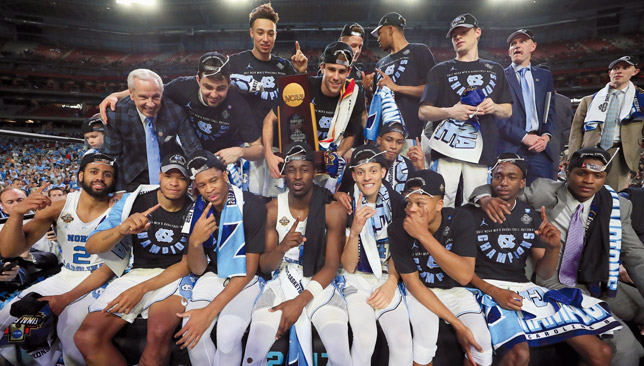
From layup to cover up. The North Carolina revenge mission may have been completed with the pain of last year’s buzzer-beater defeat to Villanova wiped away with last week’s March Madness title win over Gonzaga.
It was UNC’s seventh championship and confirmed they are the best college basketball team in the land. Yet as the tickertape fell, chronic wrongdoing and scandal were being glossed over.
In the next few weeks, the spotlight will publicly shine again though, this time, dark matters will come to the fore. An exhaustive three-year investigation involving the NCAA is coming to the end, which, some believe, will uncover the worst academic fraud in history.
It’s alleged that between 2007 and 2011 over 3,000 students were enrolled in fake classes to help bring the best athletes in the US to their coveted programme.
Tutors were found carrying out homework for students. Grades had been adjusted accordingly. Plagiarism became commonplace.
The end product for sporting supremacy? Millions of dollars for coaches, teachers and the facility. (NCAA rakes in around $900 million for March Madness alone).
The African and Afro-American studies department which has come under the severest scrutiny boasted 10 of the 15 players who helped the Tar Heels win the title 12 years ago.
UNC is the fourth team to win the #NationalChampionship after losing the Championship Game the previous year.
— NCAA March Madness (@marchmadness) April 4, 2017
1982 UNC
1991 Duke
1998 UK pic.twitter.com/Cdhqj4wd5j
“Their classes were especially popular among those who played the ‘revenue’ sports of football and men’s basketball,” said a report.
To hell what happens in the classroom. Education? No, just worry about the next match.
Such a flagrant trouncing of rules by greedy men who should know better ignores the effect this will have on those in the system right now and in the future.
This sorry state of affairs is nothing new. College sports has been riddled with corruption for years.
University of Southern California (USC) were forced to take away 30 scholarships and had two title triumphs overturned because of illegal payments made to agents in 2010. A year later, Ohio State were banned after players received money for autographing memorabilia. Yet this mess digs far deeper into the depths of a continually abused system.
The whispers about UNC grew too loud to ignore and in 2014 Kenneth Wainstein, a former assistant attorney general, was asked to compile a report. His findings were remarkable. Student athletes were pushed towards meaningless subjects and even told to have a sleep at their desk if it all got too much. But despite all this, it took the NCAA ages before acting decisively.
Last December, a tough set of accusations against the university were filed. UNC lawyers agreed but quickly passed the buck back to the NCAA, whose rules members are supposed to operate under.
Taking retrospective action is problematic – these incidents started a decade ago – though naturally, the response on campus was one of startling innocence. Behind the scenes however, everyone knew about the firestorm brewing.
Other former employees spoke of UNC operating, “like a crime family who would do anything to protect their athletic machine.”
No team has ever had championship banners taken down but if the titles remain, penalties may still follow. Scholarships could be taken away along with wins, while strong denials from the university could see the hammer fall even harder.
“People have tested my credibility and I haven’t appreciated that,” said Roy Williams (left), UNC’s coach who has now won three titles during the period in question and bagged a nice $500,000 bonus last Monday. “It’s been used against us in recruiting… I wouldn’t wish that on my worst enemy and I don’t have too many enemies.”
The NCAA, however, appear to be pulling no punches, declaring the situation in North Carolina, “implicates issues at the very core of the Collegiate Model.”
Crunch time is looming. The lines between academic and sporting prowess have been blurred and the NCAA need to act or risk further embarrassment elsewhere.